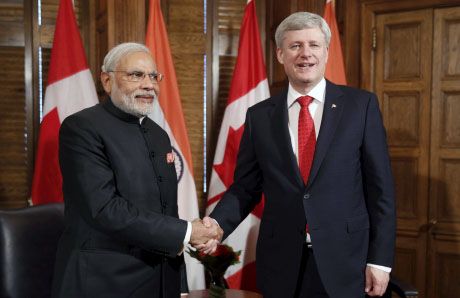Features
You are here
Canada-India cooperation: nuclear power vs people power

April 17, 2015
Harper has deported temporary workers, many from India, but welcomed Crime Minister Modi. While the official visit was to fuel corporate power and nuclear conflict, real cooperation comes from global movements for peace, climate justice, migrant justice and equality.
Canadian corporations use the Temporary Foreign Workers Program to exploit migrant workers, many from India, who are denied wages, labour rights and citizenship. On April 1 the Harper government ordered 70,000 temporary workers to leave or be deported. Two weeks later Harper welcomed Indian Prime Minister Narendra Modi with open arms.
Crime Ministers
Harper supported George Bush’s Iraq War that killed a million people, and has continued his support by deporting war resisters and resuming the bombing of Iraq. In 2009 he ignored the demand by Lawyers Against the War to arrest Bush during his visit to Toronto. The following year Harper welcomed Israeli Crime Minister Benjamin Netanyau, as Israeli commandos were killing humanitarian activists aboard a flotilla in international waters.
This week Harper welcomed Indian Crime Minister Narendra Modi, but there were protests everywhere he went. As a protester in Vancouver said, “He is a known butcher. His nickname is the Butcher of Gujarat.”
Modi was chief minister of Gujarat during the 2002 pogrom that killed 1,000 Muslims. The group Sikhs for Justice tried to have him charged during his visit, and an Ontario Court found there was enough evidence to start criminal proceedings. But the Attorney General of Ontario intervened. According to Gurpatwant Singh Pannun, legal advisor to Sikhs for Justice, Modi “escaped trial on the charges of torture under Canadian law only because of the Attorney General’s last-minute intervention.”
As Harper said to Modi, "you are very much amongst friends here," and Harper and Modi share much in common: they scapegoat Muslims, they ignore violence against women (while the Indian government banned the documentary India’s Daughter that exposed rape culture, Harper has refused to investigate missing and murdered Indigenous women) and they serve corporate interests.
Nuclear war
While the West has threatened war to prevent Iran from acquiring one nuclear weapon, the biggest nuclear powers in the world have been quietly supporting nuclear proliferation in Israel, Pakistan and India—none of whom have signed the Non-Proliferation Treaty.
Canada has a long record of complicity, supplying the uranium for the atomic bombs that the US (the greatest nuclear threat) used to kill hundreds of thousands in Japan in 1945. The mining itself in the North West Territories also killed Indigenous communities with cancer.
While Harper calls Iran the “biggest threat to world peace,” he doesn’t seem to mind giving mountains of uranium to a violent Hindu nationalist in an arms race with Pakistan. The claim that the uranium will not encourage nuclear war was debunked just hours after the deal was signed, when India test-fired a missile capable of carrying nuclear weapons.
Climate justice
Nuclear power heightens two existential threats: nuclear war and the climate crisis. Some claim that nuclear power is a “green alternative” but this ignores the huge carbon emissions from mining and refining uranium, not to mention the radioactive toxic waste that’s produced. Nuclear power is completely intertwined with fossil fuels, including the idea of using it to power the tar sands.
The imposition of corporate nuclear power plants also erodes local democracy, as Indian environmental justice activist Vandana Shiva explained a few years ago: “One of the most fertile parts of India in the Western Ghats, the Ratnagiri district, this planning to set up the biggest ever nuclear power plant of the world…violating every right of the people, including local democracy, where people have a right to decide what happens…So, in India, the costs are even higher, because the human costs join with the costs of nuclear hazard.”
People power not nuclear power
The Canada-India nuclear deal has been justified as a way to provide electricity to the millions of people across India who lack access, which is the same argument about GMO foods. But world hunger does not exist because of the lack of food but because of its unequal distribution, which GMO foods do nothing to address (instead, they further concentrate power in food corporations).
Similarly the lack of access to electricity is not because of a lack of uranium but because of inequality. According to Forbes, “India’s rich are riding high on prime minister Narendra Modi’s electoral promise of ‘good times.’ A record 90 Indians with a combined net worth of $295 billion, feature in Forbes Billionaires List 2015, of which 28 make their appearance for the first time.”
But there are movements challenging inequality, in the streets and at the ballot box. On February 10 the Aam Aadmi Party (AAP, “Common Man’s Party), won a landslide victory in Delhi—crushing Modi’s BJP party by promising to end corruption, provide access to services, and improve safety for women. Two weeks later they slashed power tariffs by half and supplied free water, two of their election promises.
This shows how solidarity with the global South does not come through the Canadian nuclear industry, or through deals between two Crime Ministers, but by building movements for peace, climate justice, migrant justice and equality.
If you like this article, register for Rage Against the System, a weekend conference of ideas to change the world, April 24-26 in Toronto. Sessions include “Stopping Harper’s agenda,” “Secularism, Islamophobia and the new racism,” and “Radical left parties: Podemos, Syriza, Québec solidaire.”
Section:
Topics:









